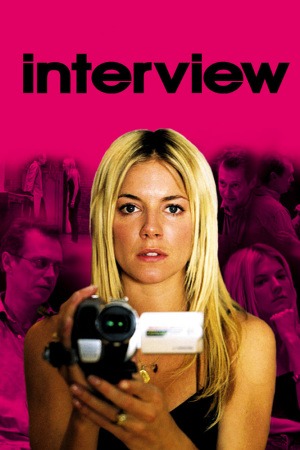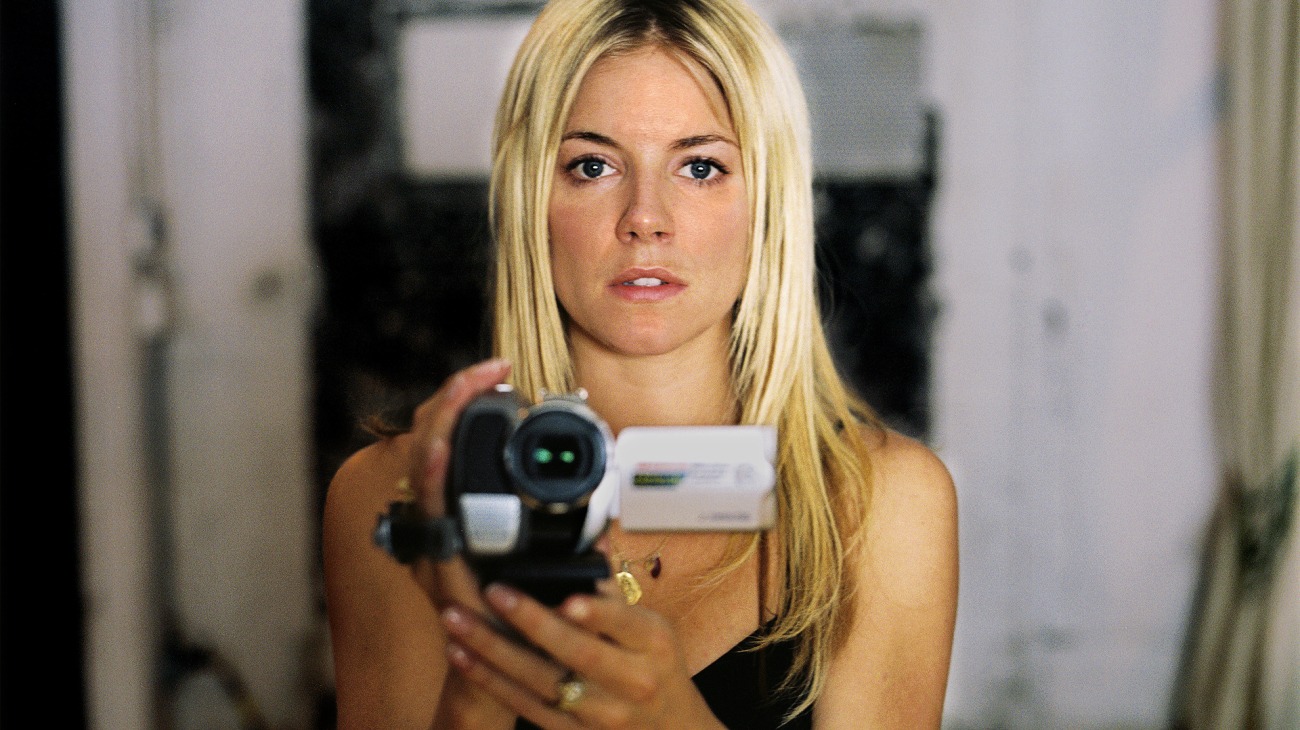
Chattering classes
I know literally two facts about the late filmmaker Theo van Gogh: he is directly descended from that Theo van Gogh, Vincent's brother; and he was knifed to death by a religious extremist for saying saucy things about Muslims.
Thanks to the fanboyish glee of writer/director Steve Buscemi (yeah, you read that right), I have now learned a third thing about van Gogh: he was a joyless drudge who liked stating the obvious, or at least that is what the new film Interview, a purportedly faithful remake of van Gogh's 2003 film of the same name. Here, in a nutshell, is the plot arc of Interview:
-So, this reporter, he's a bit of a dick.
-But this vapid starlet, she's pretty much a bitch.
-Nah, he's more of a dick.
-Still, she's quite a bitch.
-Hey...well maybe he's not so bad.
-Jesus, she's...that's rough. Poor girl.
-Whoa, what a dick!
-Fucking bitch.
Not that I'm not sympathetic to a movie with the colossal bravery to argue that journalists and celebrities are superficial assholes, but I really don't know why it takes 84 minutes to make an argument that's pretty much sealed up from the first scene: Pierre Peders (Buscemi) is waiting in a trendy New York club for Katya (Sienna Miller), to conduct an interview. She shows up obliviously late and refuses to apologise, he make many immature, sniping comments, and the audience shifts uncomfortably, hoping it won't actually be an hour and a half of this.
When you're a filmmaker, and you've got yourself a film with basically one plot point that just keeps reiterating itself over and over, it's incumbent upon you to bring something to the table that isn't the script. Buscemi doesn't. Not as a director, anyway. Films about two people just talking for an extended period of time are hard to make, I'm sure, but they have been done (I am here thinking especially of the films of Ingmar Bergman, mostly Scenes from a Marriage), and it's possible to cobble together a list of things they must have in order to work: exceptionally engaging dialogue, immaculate acting, a fearless cinematographer, and a patient audience. I can't really speak to the last of those (I started out patient...), but Interview comes sort of close to working in the other ways. At least, there's nothing objectively wrong about it: Thomas Kist is one of "those" European cinematographers, you know, "them": the ones who like to get the film looking as grainy under natural lighting as possible. Sometimes it works, and sometimes it's a cliché, and I think in this case it's a cliché. The dialogue is also kind of clichéd: not such that a mainstream American moviegoer would notice, but it's extraordinarily European, full of those glowering silences and massively compound sentences.
If Buscemi were a very good director, he would be able to turn this traits into strengths; but he is only barely a passable director. When I think back on Interview, I find that I am primarily thinking of some exceptionally contrived blocking, in which characters wander around from place to place for no apparent reason other than to change the background scenery. Nor does the director do well by his actors, which is kind of warped given that he is one.
Honestly, I think that both Buscemi and Miller could have done better things with better dialogue, and less fidgety stage business. Particularly Miller, who has unmistakable screen presence and a woefully underdeveloped role: she's a scandalously famous celebrity who enjoys lying to people and treating her sexuality like a cat toy, and that's that. Admittedly, there are some diverting moments, here and there, watching the actors spar with each other, a task which they dig into with great aplomb.
Ultimately, none this distracts from the essential problem at Interview's core: there is precious damn little about watching a reporter and an actress trying to outsmart each other that could possibly be described as "compelling." We already hate journalists and celebrities, don't we? So seeing this much time thrown at an argument that they're bad people feels more than a little redundant. I would love to say that the film succeeds in its attempt to say something about sexual power struggles, or star culture, but it doesn't even come close. These people are lying vampires. We get it. Moving on now.
5/10
Thanks to the fanboyish glee of writer/director Steve Buscemi (yeah, you read that right), I have now learned a third thing about van Gogh: he was a joyless drudge who liked stating the obvious, or at least that is what the new film Interview, a purportedly faithful remake of van Gogh's 2003 film of the same name. Here, in a nutshell, is the plot arc of Interview:
-So, this reporter, he's a bit of a dick.
-But this vapid starlet, she's pretty much a bitch.
-Nah, he's more of a dick.
-Still, she's quite a bitch.
-Hey...well maybe he's not so bad.
-Jesus, she's...that's rough. Poor girl.
-Whoa, what a dick!
-Fucking bitch.
Not that I'm not sympathetic to a movie with the colossal bravery to argue that journalists and celebrities are superficial assholes, but I really don't know why it takes 84 minutes to make an argument that's pretty much sealed up from the first scene: Pierre Peders (Buscemi) is waiting in a trendy New York club for Katya (Sienna Miller), to conduct an interview. She shows up obliviously late and refuses to apologise, he make many immature, sniping comments, and the audience shifts uncomfortably, hoping it won't actually be an hour and a half of this.
When you're a filmmaker, and you've got yourself a film with basically one plot point that just keeps reiterating itself over and over, it's incumbent upon you to bring something to the table that isn't the script. Buscemi doesn't. Not as a director, anyway. Films about two people just talking for an extended period of time are hard to make, I'm sure, but they have been done (I am here thinking especially of the films of Ingmar Bergman, mostly Scenes from a Marriage), and it's possible to cobble together a list of things they must have in order to work: exceptionally engaging dialogue, immaculate acting, a fearless cinematographer, and a patient audience. I can't really speak to the last of those (I started out patient...), but Interview comes sort of close to working in the other ways. At least, there's nothing objectively wrong about it: Thomas Kist is one of "those" European cinematographers, you know, "them": the ones who like to get the film looking as grainy under natural lighting as possible. Sometimes it works, and sometimes it's a cliché, and I think in this case it's a cliché. The dialogue is also kind of clichéd: not such that a mainstream American moviegoer would notice, but it's extraordinarily European, full of those glowering silences and massively compound sentences.
If Buscemi were a very good director, he would be able to turn this traits into strengths; but he is only barely a passable director. When I think back on Interview, I find that I am primarily thinking of some exceptionally contrived blocking, in which characters wander around from place to place for no apparent reason other than to change the background scenery. Nor does the director do well by his actors, which is kind of warped given that he is one.
Honestly, I think that both Buscemi and Miller could have done better things with better dialogue, and less fidgety stage business. Particularly Miller, who has unmistakable screen presence and a woefully underdeveloped role: she's a scandalously famous celebrity who enjoys lying to people and treating her sexuality like a cat toy, and that's that. Admittedly, there are some diverting moments, here and there, watching the actors spar with each other, a task which they dig into with great aplomb.
Ultimately, none this distracts from the essential problem at Interview's core: there is precious damn little about watching a reporter and an actress trying to outsmart each other that could possibly be described as "compelling." We already hate journalists and celebrities, don't we? So seeing this much time thrown at an argument that they're bad people feels more than a little redundant. I would love to say that the film succeeds in its attempt to say something about sexual power struggles, or star culture, but it doesn't even come close. These people are lying vampires. We get it. Moving on now.
5/10






